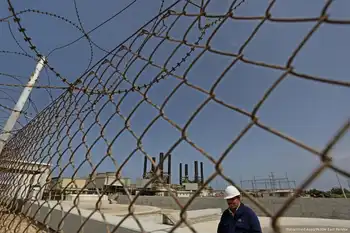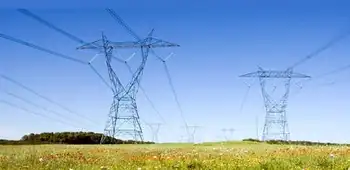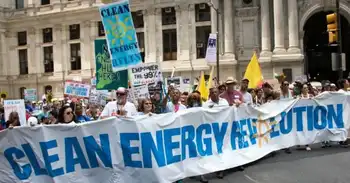Capitol power plant dims clean energy hopes
By Associated Press
Arc Flash Training CSA Z462 - Electrical Safety Essentials
Our customized live online or in‑person group training can be delivered to your staff at your location.

- Live Online
- 6 hours Instructor-led
- Group Training Available
The Capitol Power Plant, a 99-year-old facility that heats and cools the hallowed halls of Congress, still burns coal and accounts for one-third of the legislative branch's greenhouse gas emissions. For a decade, lawmakers have attempted to clean it up.
In recent years, Congress has reduced its energy consumption. The steam and chilled-water power plant has become more efficient. It now burns more natural gas and only 35 percent coal, compared with 49 percent in 2007.
But Congress is running out of options to make the plant fully green. Also, there are questions about whether it can afford to keep paying to use the extra natural gas, which burns cleaner than coal.
The plant's story is one that is likely to play out across the United States as Congress looks to limit greenhouse gases and require more of the country's energy to come from wind, solar and other renewable sources.
The issues hampering the cleanup — politics, cost and technological barriers — could trip up similar efforts elsewhere. The U.S. counts on coal-fired power plants for about half of its electricity; the plants are also the biggest source of heat-trapping gases.
So if Congress cannot act locally, as the environmental slogan goes, how can it begin to think globally?
In 2007, the facility released 118,851 tons of carbon dioxide, according to the Energy Department. That's a fraction of the amount released by the roughly 600 coal-fired power plants nationwide that produce electricity, and the emissions created at other plants from which Congress buys power.
"We are holding it up as a symbol for how we can and must do better," said Mike Tidwell, director of the Chesapeake Climate Action Network. It is among 40 environmental organizations that protested at the plant a few blocks south of the Capitol.
Among them will be James Hansen, the NASA scientist who first testified in 1988 about the perils of global warming. He has called for halting construction of new coal-fired power plants without technology to capture and store carbon dioxide, the most prevalent greenhouse gas.
"They need to start by getting the coal out of Congress," Hansen said.
While carbon dioxide from the facility could be reduced 60 percent using carbon sequestration technology, the Energy Department in April 2008 ruled that out. The $112 million cost was too high. There is no place nearby to dispose of the gas and the extra coal burned to run the carbon-trapping equipment would increase other types of air pollution.
Recognizing this dead end, House Speaker Nancy Pelosi, D-Calif., and Senate Majority Leader Harry Reid, D-Nev., wrote the Architect of the Capitol with another recycled idea: convert the plant entirely to natural gas.
While four times more expensive than coal, natural gas produces about half as much carbon dioxide.
Referring to the facility as a shadow hanging over efforts to make Congress more environmentally friendly, the leaders said the conversion would demonstrate Congress' willingness to deal with global warming, energy independence and the use of finite fossil fuels.
An effort in 2000 to rid the plant of coal and oil was blocked by two senators from coal-producing states. Sens. Robert Byrd, D-W.Va., and Mitch McConnell, R-Ky., argued at the time that the continued use of coal would save taxpayers money because it is cheaper than natural gas.
Byrd seemed more willing to compromise, saying he would support looking at the natural gas option.
Converting the plant entirely to natural gas would require equipment upgrades at the facility that would cost between $6 million and $7 million, in addition to having to buy more natural gas. It would cost $139 per ton of carbon dioxide saved, or about $2 million a year just for the House's portion of heating and air conditioning.
Pelosi and Reid say the investment far outweighs the costs. But in the midst of an economic crisis, it is not clear if that would be money well spent.
"It doesn't make any difference what they do," said Bill Kovacs, vice president for the environment, technology & regulatory affairs at the U.S. Chamber of Commerce. "It makes a statement, but it is not going to change carbon dioxide concentrations at all anywhere in the world and coal will continue to be used somewhere else."
Coal-fired power plants elsewhere will have difficulty meeting new mandates if passed by lawmakers.
"The oldest and dirtiest ones will not compete well under that system," said Tidwell, who supports efforts to get the Capitol Power Plant off coal. "The people who own those power plants will have to make some choices."











